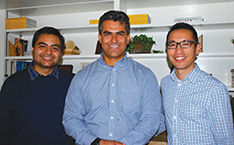Franky Carrillo has told his story many times: to newspaper writers, TV reporters, state senators, lawyers, juveniles in prison and countless others. When he shares his story — whether it’s to big crowds or intimate gatherings — Carrillo’s emotions often come to surface.
Carrillo, now 41, spent 20 years behind bars for a murder he did not commit.
Recently the Echo Park resident was invited by the Social Justice and Peace and Young Adult committees at St. Andrew Church in Pasadena for an informal discussion on his experience, the power of forgiveness and how to respond to social sin.
All in all, Carrillo recounts his story with honesty, describing how he was determined to change the conviction (two consecutive life terms) rather than descend into hostility and hatred towards his false accusers, God and life in general.
In fact, Carrillo’s calm acceptance and gentle polite demeanor seem incredible for a man who was robbed of his formative years of life.
“You don’t sound bitter at all!” exclaims one St. Andrew attendee. “Well, I’m not,” says Carrillo, explaining that he didn’t want hate, fear and unhappiness to destroy him — either inside of prison or outside. “What’s the point of being free if all I am is angry?” he posits.
Raised in Lynnwood by his single-parent father, Carrillo recalls his childhood as typical in the late 1980s. While he admits he did make some bad choices, he was never in trouble with the law. In January 1991, 15 sheriff deputies ransacked the family apartment with guns drawn, looking for evidence to connect Carrillo with a murder of an African American youth in Lynnwood.
Carrillo discovered later that a rogue group of corrupt and racist Los Angeles County Sheriff’s deputies — known as the “Lynwood Vikings” — coerced six key witnesses to identify him as the killer from a photo lineup.
It was their word against his and, in the end, the jury trial found Carrillo guilty of murder.
After the shock wore off, Carrillo embarked on a letter-writing campaign, reaching out for help to overturn the sentence. His case finally caught the attention of a Sacramento law firm who helped find the real murderers and bring enough evidence to retry the case, eventually overturning the original sentence. Five of the six witnesses recanted their testimonies (the sixth refused to testify) and Carrillo was released in March 2011.
Since then, Carrillo enrolled in Loyola Marymount University (graduating this year with a sociology degree), got married and is father to a 2-year-old. Prior to his incarceration, his teen girlfriend was pregnant. She raised the baby and Carrillo did all he could to stay connected to his now 24-year-old son.
“I wrote him a letter every week for 15 years,” he says. “Today, we have a good relationship.”
St. Andrew parishioners were especially curious how Carrillo’s faith carried him through his incarceration — his last 10 years were spent in Folsom Prison, and his father died before Carrillo was released.
“Being in jail is a dehumanizing process but I found strength in God,” he says. “There were small events that, taken as a whole, gave me the courage. I knew I was innocent and I had to keep fighting.”
Those “God-inspired” incidents involved reoccurring dreams, letters, visitors and positive-minded incarcerated men who offered timely advice. Carrillo describes receiving a “Footsteps in the Sand” bookmark right when he needed it the most.
“I realized that God is carrying you when you most need it,” he says. “I still have that bookmark with me today.”
When asked by the attendees if they should join in a prison ministry, Carrillo nodded vigorously.
“I often volunteer at juvenile hall and that experience will help them as well as you in your belief,” he says. In addition, Carrillo is a lobbyist on federal and state levels for juvenile fair sentencing; he’s also a board member of the Anti-Recidivism Coalition, which helps newly released citizens regain their place in society.
Finally, Carrillo was adamant that folks take jury duty seriously.
“People just like you found me guilty,” he says. “You have to be the ones to find the truth and justice of any case. It is that important.”

